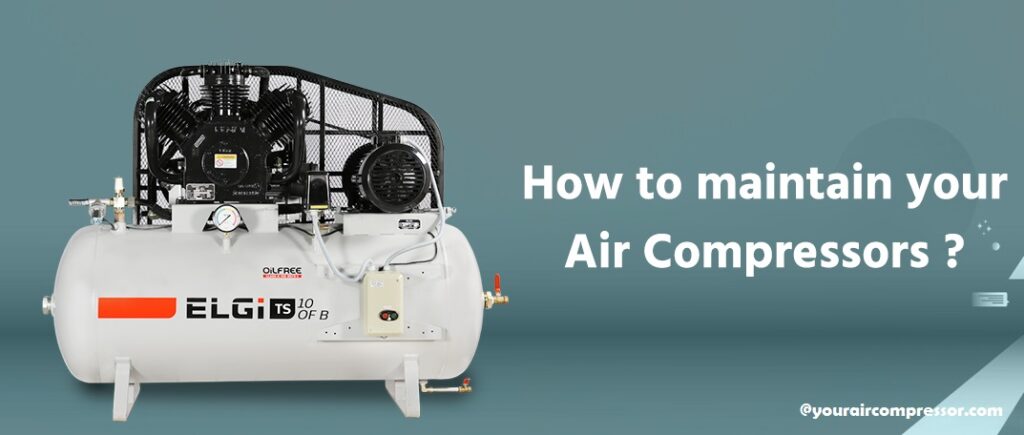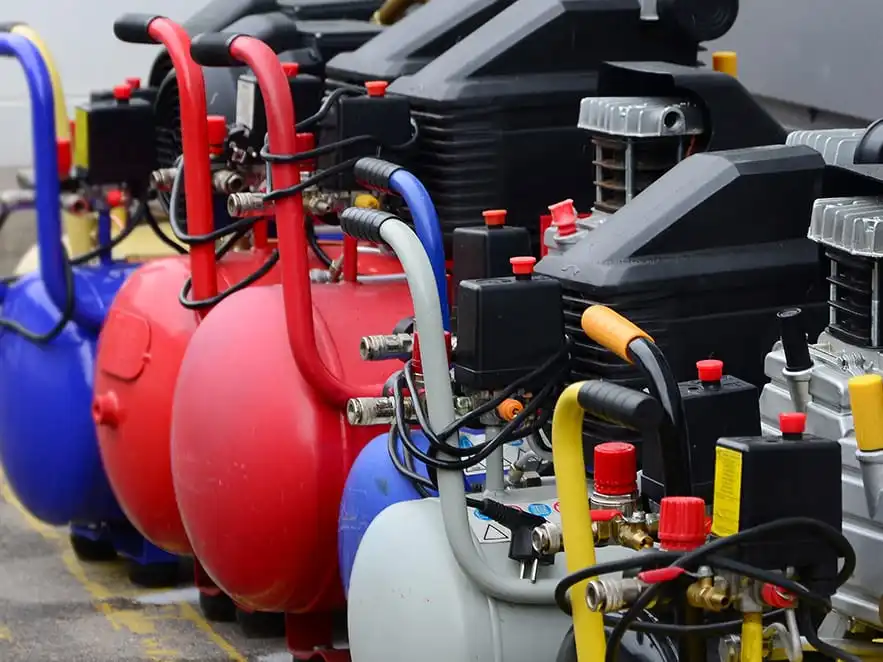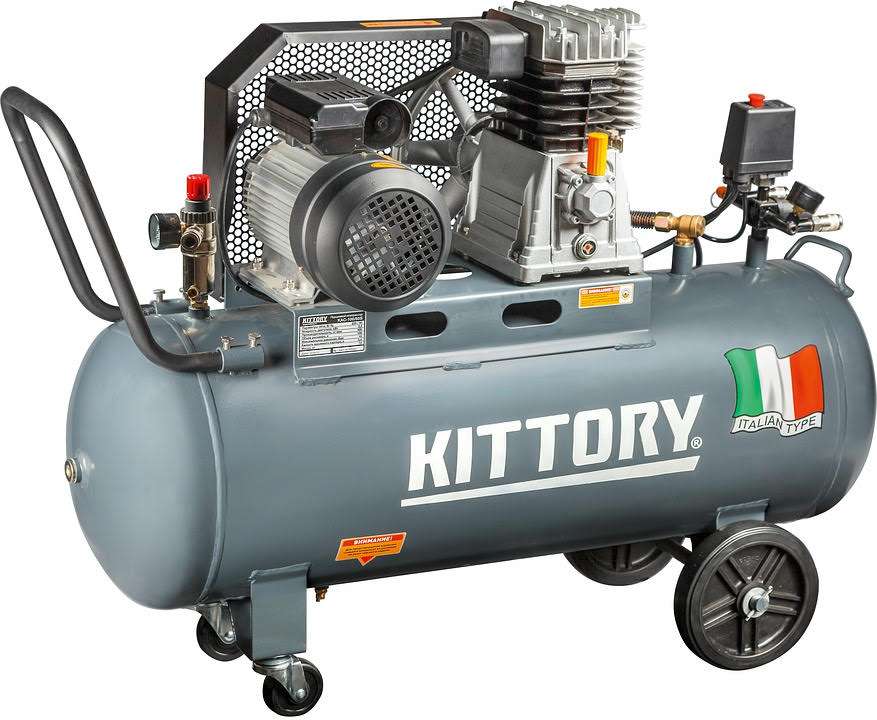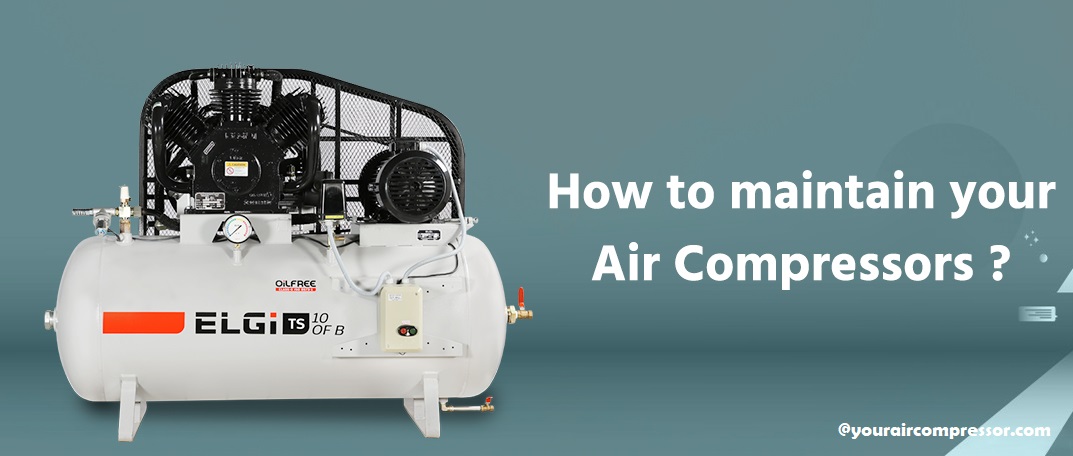Are you having trouble keeping your air compressor running smoothly? With this complete guide, you’ll be able to ensure optimal performance and extend the life of your machinery.
Learn the secrets to maintaining a reliable and efficient compressor – so you can keep on working.
An air compressor is a device that increases pressure of an incoming airflow and delivers it as an outlet flow at higher pressure. It is essential for many engineering and industrial applications, especially in the transportation sector. Most industrial machines and production lines demand compressed air for their operations. Air compressors come in various sizes, capabilities, and power ratings. However, regardless of its size or model, the machine requires regular maintenance to ensure optimal performance and safety standards.
A lack of attention to the device’s maintenance can lead to poor performance or even a malfunction or breakdown of the compressor. To guarantee peak performance and extended service life while also avoiding any safety issues, users should routinely inspect various components of their air compressors as well as adhere to best practices when it comes to preventive maintenance (PM) procedures.
This guide provides a comprehensive overview of essential practices for maintaining your air compressor; from inspecting its housing to checking pressure valves and hoses for wear-and-tear—all these steps are necessary for preserving your compressor. Taking into consideration factors such as environmental conditions (e.g., dust), external components (e.g., intake filters), safe operation (e.g., electrical protection), lubrication procedures, drain systems and more—the guide helps keep your compression system running smoothly while providing you with invaluable tips on how to troubleshoot possible problems.
Briefly introduce the importance of maintaining air compressors for optimal performance
Air compressors can be an essential piece of equipment for many industrial jobs. Proper maintenance and upkeep is essential for achieving optimal performance from your air compressor, as well as for ensuring its longevity.
Regular maintenance not only prevents breakdowns and costly repairs down the line, but also helps protect air quality and reduce airborne pollutants from being released into the environment. A properly maintained air compressor also ensures that you get more out of each unit, meaning you save time and money.
Here are some tips on how to keep your air compressors running smoothly so that they provide efficient performance on a regular basis.
Explain why it’s crucial to have a well-maintained air compressor
Having a well-maintained air compressor is essential to keeping it running smoothly and preventing costly repairs. Air compressors are subject to a lot of wear and tear if not properly cared for, leading to potential breakdowns at the worst possible times. Proper maintenance not only ensures that your machine runs at its optimal performance level, but it also helps maintain safety in the workplace.
Regular maintenance will help ensure that your air compressor is operating efficiently which can also help reduce your electricity bill by ensuring you don’t waste energy running machines that are not operating at their best capacity. Additionally, routine maintenance can allow you to quickly identify any underlying issues before they become more serious and difficult to repair. This could possibly save you time and money in the long run.
Some basic maintenance activities include checking the oil levels, inspecting hoses for cracks or leaks, cleaning all dust away from the unit’s internal components, and replacing necessary seals or gaskets as needed. Furthermore, pay attention to any unfamiliar noises coming from your unit as this could be a sign of a malfunctioning piece of equipment or loose part that needs immediate attention. By regularly performing preventive inspections on your air compressor you will ensure safe downtown-free operation for many years to come!
Provide a preview of the key points to be discussed in the guide
In order to maintain optimal performance of your air compressor, it is important that you understand the various parts of the machine, the maintenance and repair needs, and the safety precautions that must be taken. This guide will provide an overview of how to ensure your air compressor is well cared for, including:
- Understanding the critical components and their functions.
- Identifying common maintenance and repair needs.
- Practicing safe operating procedures when using an air compressor.
- Taking preventative measures to extend the life of your machine.
By following this guide you can ensure your air compressor is operating at peak performance for a prolonged period of time.
Safety Measures
Proper safety measures should always be taken when working with an air compressor. Prior to undertaking any task that requires the use of an air compressor, be sure to wear protective gear, such as face and eye protection, a dust mask and hearing protection.
Ensure that the electrical cords are free of fraying or damage. Make sure all parts of the air compressor are properly connected and tight. Check for damages or wear that could cause unexpected outages or serious malfunctions when using the unit.
Adequate ventilation should always be available in order to insure breathable ambient air quality while operating your unit. Lastly, never operate your air compressor without adequate emergency shut-off systems in place, including emergency shut off valves and manual shut off devices.
Discuss safety measures that should be taken when performing maintenance on an air compressor
Servicing your air compressor is essential to optimum performance. Before performing maintenance on your air compressor, proper safety precautions should be taken. Wear protective eyewear, gloves and a dust mask to protect yourself from the environment while working with power tools. Be aware of the exhaust noise that can cause hearing damage, and use hearing protection if needed.
Check the area where you are performing maintenance to make sure that no combustible material is near operating machinery. Additionally, it’s important to properly dispose of debris and unused material after servicing an air compressor in order to ensure safe operation of the equipment for future use.
Explain how to properly shut off and disconnect an air compressor
Properly shutting off and disconnecting your air compressor is an important part of maintenance and ensuring optimal performance. It is not enough to simply turn off the power, as there are other components to consider. To ensure your safety and long-term operation of the machine, these steps must be taken.
Before unplugging or shutting off the compressor, you must release the pressure within the unit. This can be done by opening all valves on the system, allowing built-up pressure to dissipate slowly. Once this is accomplished, you can disconnect any power sources — such as a wall outlet or generator – powering the compressor. Generally speaking, you should never force a connector into an electrical outlet; they must fit snugly and easily when connected correctly.
Once all power sources are disconnected, it is essential to open all drains on both the input and output sides of your air compressor. This will allow any remaining water or air to be released from either end of your machine before it’s shut down for extended periods or stored away for later use. Shutting off and disconnecting an air compressor is not difficult with these easy steps in mind; however, should difficulties arise it’s always recommended that assistance from a qualified technician be sought out if you feel uncomfortable with performing this process yourself.
Importance of Regular Maintenance
Regular maintenance can keep your air compressor in good working order and ensure that it lasts for many years. Some major benefits of regular maintenance include increased performance, improved safety, better fuel efficiency, and a reduction in downtime and repair bills. Regularly scheduled maintenance also allows the machine to maintain its manufacturer’s warranty or an extended warranty, if purchased.
Regularly scheduled maintenance allows your machine to run more efficiently by keeping parts clean of debris that would impede its performance. Dirty and dusty components can reduce the lifespan of your compressor—they can also cause abrasions potentially damaging moving parts and filters which could, in turn, affect safety due to excessive pressure buildup. In addition, regular oil changes will prevent dirt and debris from building up in the machine’s components which may interfere with operation. Maintaining lubrication levels helps to ensure that all components run smoothly together while improving fuel efficiency by reducing friction between them.
Furthermore, regularly checking fluid levels as well as checking hoses for leaks is important as a lack of fluids or even small leaks could cause costly repairs if undetected for too long—possibly leaving your air compressor out of commission until repaired. Ensuring all switches are firmly engaged is equally critical; switching off the power source before performing any inspection or cleaning can help avoid electrocution hazards.
Discuss the consequences of neglecting regular maintenance
Neglecting to perform routine maintenance on your air compressor can lead to a number of adverse problems. Not only will it start to become less efficient, but it can also significantly reduce its performance and longevity. Failing to service an air compressor on a regular basis can result in the following:
-Increased energy costs: When a compressor is not serviced regularly, it is more likely to use more energy due to inefficiencies caused by the dirt, carbon and soot that builds up inside of it. This results in increased electricity bills.
-Decreased life expectancy: An air compressor without regular maintenance is more likely fail earlier than one that has been routinely serviced. The longer that you delay necessary maintenance, the shorter its useful life will become.
-Reduced power output: Dirt, carbon and soot can block vital parts such as filters and valves, thus reducing the amount of air being delivered by the compressor. A blocked filter element or valve needs immediate attention or else this blockage may lead to poor performance and mechanical breakdowns.
-Frequent repairs: If you neglect servicing your air compressor, then it will be at greater risk for premature failure due to wear and tear caused by dirt buildup. If the machine does not receive preventive maintenance according to a schedule provided by its manufacturer, then it is likely that major repairs may be needed in order for it operate properly again once any underlying problems have been addressed.
Highlight the benefits of regular maintenance
Regular maintenance of your air compressor is a key way to ensure that it continues to operate at peak performance. Taking the time to properly maintain your unit can help keep it running smoothly for years, save you money on repair costs, and provide many benefits in terms of efficiency and reliability.
Here are some key benefits of maintaining your air compressor regularly:
- Extending its life span: Regular maintenance can prevent costly repairs, spare parts replacement and other disruptions that can be caused by an inadequately maintained compressed air system. Regular servicing will reveal any issues before they become serious enough to cause a costly malfunction.
- Enhances efficiency and performance: By performing regular maintenance checks on the unit, the user can make sure that it’s performing at its optimal level. This will result in much higher output compared to what you’d get from an unmaintained system.
- Reduces running costs: Regular maintenance helps ensure maximum efficiency as well as peak performance which translates into lower power consumption and therefore lower operating costs over time.
- boosts safety: Performing regular safety inspections will ensure that the equipment complies with regulations regarding proper use and performance of compressed air systems. This reduces the likelihood of accidents due to faulty equipment or machinery malfunctioning due to human error during operation or maintenance activities.
Maintenance Schedule

Creating a regular maintenance schedule is an important part of optimizing your air compressor’s performance. This schedule should include routine inspections, preventive maintenance, and regular cleanings to ensure that your air compressor continues to work efficiently and effectively.
Inspections: Inspect your air compressor’s pressure valves, check valves, belts, hoses and seals for signs of wear or damage at least once a month. Replace any worn or damaged parts immediately to avoid further issues in the future.
Preventive Maintenance: Make sure to drain the compressor’s oil tanks regularly (every 3 months is recommended). Replace filters accordingly or on a schedule that fits with how often you use your air compressor. Check for leaks and fix them as soon as possible to prevent further engine damage. Regularly lubricate compressors and other moving parts to prevent wear and tear on components.
Cleanings: Clean your air filter on a frequency that matches up with how often you use the machine (every 3-6 months). Wipe down components such as the condenser, air filter housing and the motor-driven couplings regularly with a damp cloth to eliminate any dust build-up which can lead to blocked airflow in the tank over time.
Discuss the recommended maintenance schedule for air compressors
Maintaining your air compressor is essential for optimal performance and avoiding expensive repair bills. Ideally, air compressors should be serviced and inspected annually by a qualified service provider. This ensures all parts are working correctly, potential problems are addressed early, and the air compressor lasts longer.
Here’s what a maintenance schedule typically looks like:
- Inspect belts and pulleys: Check that all compressed air belts and pulleys remain in proper tension, linked together securely, free of cracks or fraying, and adjusted for the correct RPMs.
- Check lubricant levels: Make sure lubricant is changed once every 6 to 12 months, depending on daily usage, or as specified by the compressor manufacturer’s manual.
- Check air filters: Examine your compressor’s intake filters for dirt buildup or corrosion; if needed, clean out or replace them with clean equivalents rated for your system’s conditions.
- Check condenses drains: Periodically monitor both automatic drains (timed to open regularly) and manual valves (manually opened)and make sure they’re not leaking or stuck open/closed due to clogs or wear-and-tear damage; these should be replaced as needed during scheduled maintenance sessions to maximize efficiency levels at all times
- Check pressure gauges: Make sure that all pressure gauges read accurately so you can closely monitor activity within your system throughout its working cycles; these should also be recalibrated at least once per year—more frequently if you operate in extreme conditions.
- Check safety valves: While inspecting pressure gauges, look closely at attached safety valves to verify they are not corroded or excessively worn down; always follow instructions provided in any relevant product manuals when replacing these elements of the unit—particularly paying attention to PSI recommendations provided by manufacturers.
- Clean tanks routinely: Thoroughly clean interior tanks at least once a year (or more often depending on usage); hire a professional service provider to do this if you don’t feel comfortable doing it yourself—there may be hidden dangers you’re not aware of that only someone well trained in this field would recognize before attempting an inspection (e.g., trapped materials coated with paint).
- Test file drain operation regularly: Test file drains monthly —or between scheduled maintenance appointments—to confirm they’re working properly; if not make sure repairs soon afterwards since clogging issues will have serious effects on the entire operation later down the line unless addressed quickly in time by experienced professionals familiar with such machines in detail already.
By following these regular maintenances items discussed here you will help extend the life of your air compressor while continuing its reliable performance over time!
Explain the different maintenance tasks that should be performed regularly
Regular maintenance is essential to maintain optimal performance and prolong the life of your air compressor. The following tasks should be performed regularly to keep it running efficiently:
- Check the oil level: Change and check the oil in your compressor every 3-6 months depending on usage. Make sure you use a high-quality synthetic compressor oil that meets manufacturer specifications.
- Check the air filters: Replace or clean air filters when dirty, wet or blocked. This will ensure accurate air inlet pressure and help prevent moisture from contaminating downstream components.
- Drain moisture from the tank: To reduce corrosion and maintain consistent performance, drain water from the tank daily or weekly by opening drain valves at regular intervals.
- Check hoses and fittings: Inspect hoses for signs of wear like cracking or leaking, replace any damaged hoses promptly. Inspect air fittings and confirm proper connection, replace any damaged fitting immediately.
- Clean bearings regularly: Make sure all moving parts are properly lubricated by applying grease as required – usually monthly for non-oil bath bearings or quarterly for oil bath bearings – and inspect components for smooth operation; check belts are tensioned to manufacturer specifications.
Follow these guidelines carefully along with regular visual inspection of your equipment to ensure good performance over a long period of time!
Conclusion

After performing basic or regular maintenance on your air compressor you can be sure that it will function optimally. Like any other machine, air compressors also require frequent maintenance and cleaning. Conducting a thorough inspection every few months will guarantee that you have the correct operating pressure and make sure that your system is running smoothly with no risks of breakdowns or major catastrophes in the future due to lack of adequate maintenance practices.
It is recommended that if any part of the compressor seems broken, replace it immediately as continued use without proper replacement may lead to further damage to the unaffected parts of your unit. Additionally, be alert when using compressed air around flammable materials and ensure ventilation in all working areas so as to prevent any harm from breathing in fumes or dust particles produced by the compressor during operation.
Finally, get regular maintenance done at regular intervals by certified professionals who understand the intricate details of air compressors and will ensure a sustained performance over prolonged periods of time without suffering any unexpected malfunctions.
FAQ
How do you maintain the efficiency of an air compressor?
To maintain the efficiency of an air compressor, you should regularly check and change the air filter, drain the moisture from the tank, inspect and tighten any loose connections, and lubricate the moving parts.
What maintenance does an air compressor need?
An air compressor needs regular maintenance, such as checking and changing the air filter, draining the moisture from the tank, inspecting and tightening any loose connections, lubricating the moving parts, and checking the oil level.
How can I extend the life of my air compressor?
You can extend the life of your air compressor by performing regular maintenance, following the manufacturer’s recommendations, using the compressor correctly, and keeping it in a clean and dry environment.
What factors affect compressor performance?
Several factors affect compressor performance, including the size and type of compressor, the air pressure and volume required, the ambient temperature and humidity, and the quality of the air intake.
What helps keep a compressor operating at maximum efficiency?
Keeping a compressor operating at maximum efficiency requires regular maintenance, proper use, correct sizing and installation, and ensuring adequate air intake and exhaust.
What is the importance of maintenance for air compressor?
Regular maintenance is essential for an air compressor to operate efficiently and safely, prevent breakdowns and damage, extend the life of the compressor, and ensure it meets safety and regulatory requirements.
What makes an air compressor better?
A better air compressor has features such as higher efficiency, lower noise levels, longer lifespan, more durable materials, advanced control systems, and improved safety features.
What is the best compressor efficiency?
The best compressor efficiency varies depending on the application and the specific requirements of the compressor, but generally, higher efficiency means less energy consumption and lower operating costs.
Should air compressor run continuously?
No, an air compressor should not run continuously, as this can cause overheating, reduce efficiency, and damage the compressor. It should be turned off periodically to allow it to cool down and to prevent excess wear and tear.
How often should I oil my air compressor?
The frequency of oiling an air compressor depends on the type and model of the compressor and the manufacturer’s recommendations. However, as a general rule, the compressor should be oiled every 500 hours of operation or every three months, whichever comes first.
see also…
- Best Pancake Air Compressor 2023
- Best onboard air compressor 2023
- Best oil free air compressor 2023
- Best jump starter with air compressor 2023
- Best High Pressure Air Compressor 4500 Psi 2023

